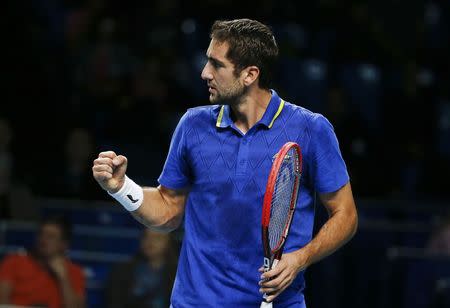Wawrinka and Cilic face toughest challenge yet
By Ian Chadband LONDON, Nov 9 (Reuters) - They muscled into the most elite club in tennis this year but, perhaps, becoming a grand slam winner was just the easy bit. Now, at this week's ATP World Tour finals in London, it is time for Stan Wawrinka and Marin Cilic to prove why they belong there. The pair have both discovered their dramatic breakthroughs — Wawrinka’s Australian Open victory in January and Cilic’s U.S. Open triumph in September — have proved no instant gateway to a new level of constant, elevated success. Swiss Wawrinka has endured a season of maddening inconsistency. Croatian Cilic, who has swung between a first- round defeat in the Shanghai Masters and a lower-key triumph in Moscow, reckons he has been a target for every wild gunslinger in town ever since mowing down all-comers at Flushing Meadows. Yet if their brilliance on the biggest stage has been harder to replicate than they could have imagined, they ought to find encouragement from the words of another first-time grand slam winner who endured plenty of under-achievement before re-emerging to prove himself one of the great champions. World No. 1 Novak Djokovic, who opens the defence of his Tour finals crown against Cilic at the O2 Arena on Monday, knows the “biggest adjustment after becoming a grand slam winner is a mental one” and fancies it could be the biggest challenge for both Cilic and Wawrinka “right now and in months and years to come.” OPEN FLOODGATES In 2008, Djokovic won the Australian Open, assuming that more grand slams would swiftly follow. Instead, it took him three years to land the next one, which then really did open the floodgates to his current haul of seven. “In my case, I did have a lot of doubts in those years after my first grand slam, mostly because I lost the majority of the big matches in the Majors against two of my biggest rivals, Roger Federer and Rafa Nadal,” said Djokovic. “I hit the bottom, I think, around 2010 but with the help of the closest people around me, my family and my team, I managed to find all the necessary mental strength and motivation to work even harder and be patient. “I could only prepare myself the best I could, take care of my life on and off the court and believe that one day I could win it again. That’s what happened, but the process itself is long and it takes a lot of mental effort.” So, this is the battle of the mind facing both Wawrinka and Cilic. The difference, of course, is that Djokovic won his first title at 20, while Wawrinka is now 29 and Cilic 26. Time is not on their side in the same way. Cilic already senses fresh pressure, as if he has a target on his back. “It’s a different feeling now. I played some matches after the US Open where the guys are playing much more risky, going all or nothing. That’s not easy to confront match after match,” he said. Wawrinka, who faces Tomas Berdych on Monday after a wretched sequence of only one match win in his last four tournaments, admits his inconsistency is harder to deal with after hitting the heights in Melbourne and Monte Carlo, where he won his first Masters title in April. “Winning a grand slam and a Masters changes your life, changes the way you have to find a way to feel good and play well in every tournament," he said, "I hope next year I can have better results in every event.” Not that Wawrinka would change anything about his landmark year, which he hopes could be capped not just by success in London but by winning the Davis Cup with Roger Federer for Switzerland in the final against France this month. What would he prefer? A London triumph or an historic victory for his country? “That’s not a good question,” he smiled. “Don’t choose.” (Editing by Ed Osmond)



